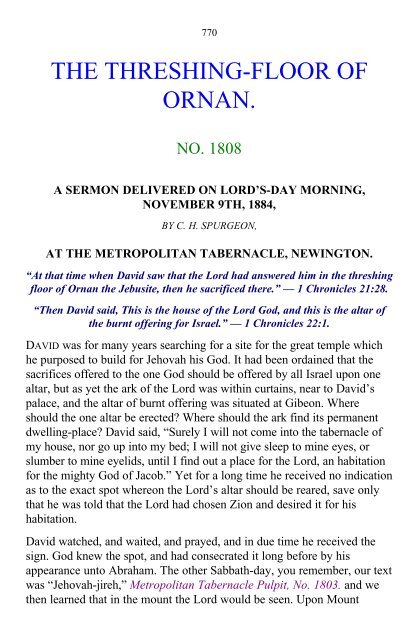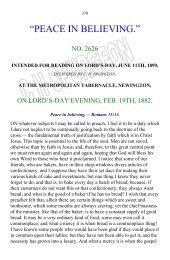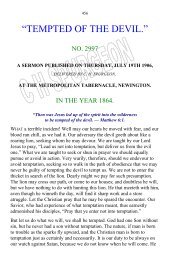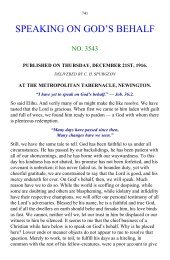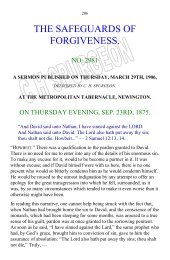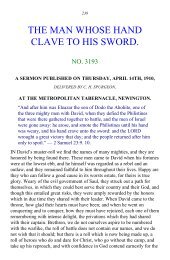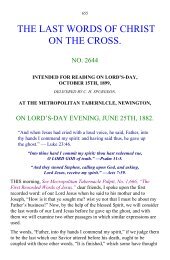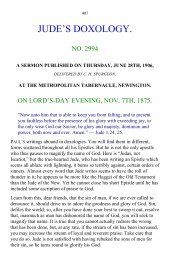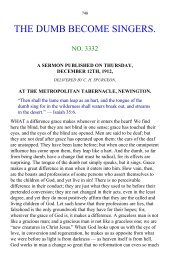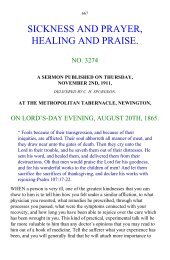THE THRESHING-FLOOR OF ORNAN. - APIBS Home
THE THRESHING-FLOOR OF ORNAN. - APIBS Home
THE THRESHING-FLOOR OF ORNAN. - APIBS Home
You also want an ePaper? Increase the reach of your titles
YUMPU automatically turns print PDFs into web optimized ePapers that Google loves.
770<br />
<strong>THE</strong> <strong>THRESHING</strong>-<strong>FLOOR</strong> <strong>OF</strong><br />
<strong>ORNAN</strong>.<br />
NO. 1808<br />
A SERMON DELIVERED ON LORD’S-DAY MORNING,<br />
NOVEMBER 9TH, 1884,<br />
BY C. H. SPURGEON,<br />
AT <strong>THE</strong> METROPOLITAN TABERNACLE, NEWINGTON.<br />
“At that time when David saw that the Lord had answered him in the threshing<br />
floor of Ornan the Jebusite, then he sacrificed there.” — 1 Chronicles 21:28.<br />
“Then David said, This is the house of the Lord God, and this is the altar of<br />
the burnt offering for Israel.” — 1 Chronicles 22:1.<br />
DAVID was for many years searching for a site for the great temple which<br />
he purposed to build for Jehovah his God. It had been ordained that the<br />
sacrifices offered to the one God should be offered by all Israel upon one<br />
altar, but as yet the ark of the Lord was within curtains, near to David’s<br />
palace, and the altar of burnt offering was situated at Gibeon. Where<br />
should the one altar be erected? Where should the ark find its permanent<br />
dwelling-place? David said, “Surely I will not come into the tabernacle of<br />
my house, nor go up into my bed; I will not give sleep to mine eyes, or<br />
slumber to mine eyelids, until I find out a place for the Lord, an habitation<br />
for the mighty God of Jacob.” Yet for a long time he received no indication<br />
as to the exact spot whereon the Lord’s altar should be reared, save only<br />
that he was told that the Lord had chosen Zion and desired it for his<br />
habitation.<br />
David watched, and waited, and prayed, and in due time he received the<br />
sign. God knew the spot, and had consecrated it long before by his<br />
appearance unto Abraham. The other Sabbath-day, you remember, our text<br />
was “Jehovah-jireh,” Metropolitan Tabernacle Pulpit, No. 1803. and we<br />
then learned that in the mount the Lord would be seen. Upon Mount
771<br />
Moriah, on or near that particular spot which had been named Jehovahjireh,<br />
was the temple to be built. Abraham had there unsheathed the knife<br />
to slay his son. Wondrous type of the great Father offering up his Onlybegotten<br />
for the sins of men! The scene of that grand transaction was to be<br />
the center of worship for the chosen people. Where Abraham made the<br />
supreme sacrifice, there should his descendants present their offerings. Or<br />
if we look into the type and see God there presenting Jesus as a sacrifice<br />
for men, it was most suitable that man should for ever sacrifice to God<br />
where God made a sacrifice for him. As yet it was not known to David that<br />
this was the chosen place. Now it is indicated by memorable signs: the<br />
angel of justice stands above the spot; and his sword is sheathed there in<br />
answer to the cries of the afflicted king, according to the long-suffering<br />
mercy of God. Then David clearly saw the mind of the Lord, and said,<br />
“This is the house of Jehovah my God, and this is the altar of the burntoffering<br />
for Israel.” Then he commenced at once with double speed to<br />
prepare the materials for the temple. Though he knew that he might not<br />
build it, since his hands had been stained with blood, yet he would do all<br />
that he could to help his son Solomon in the great enterprise.<br />
This problem which David had at last worked out by the good hand of God<br />
upon him, is one which in a deep spiritual sense exercises our hearts full<br />
often. Where is it that man may meet with God? How is it that man may<br />
speak with his offended Lord and be reconciled to him? Is there not some<br />
meeting-place where the sinner may express his repentance, and where<br />
mercy may grant full absolution? Many are saying, “Oh, that I knew where<br />
I might find him!” Hearts touched by the Spirit of God are still seeking<br />
after God if haply they may find him. In what condition, and by what means<br />
may man be at peace with God, and dread no longer the sword of his<br />
justice?<br />
For the heart of some of us that problem takes a further shape: we know<br />
where man may meet with God, but we want to know how the careless,<br />
proud, rebellious heart shall be induced to come to God in his appointed<br />
way. We know it is by the power of the Holy Ghost, through the preaching<br />
of the word, and the uplifting of the all-attracting cross; but we would fain<br />
know the state of mind which will lead up to reconciliation; for now we<br />
often have to go back to him that sent us, and to cry, “Who hath believed<br />
our report? and to whom is the arm of the Lord revealed?” We would lead<br />
men to God by Jesus Christ if we could; we stretch out the finger, and we<br />
point the way, but they will not see, we stretch out both hands, and intreat
772<br />
them to come, but they will not yield; our heart breaketh for the longing<br />
that it hath to present every man in Christ reconciled unto the living God;<br />
but how shall it be? How shall the sinner come unto God?<br />
We may get some light from the type before us upon that question —<br />
Where shall God’s temple be? How shall men be brought to it? We speak<br />
not at this time upon natural things, but upon the things of the Spirit;<br />
therefore let us pray the Holy Spirit to enlighten and instruct us, for only by<br />
his aid shall spiritual truth enter our hearts!<br />
And, first, I remark that externally there was, and there is nothing in any<br />
place why it should be the peculiar meeting-place of God with man; but,<br />
secondly, that spiritually the place which God did choose was most<br />
suitable; for in it we read the true ground upon which God does actually<br />
meet with men in a way of grace. When we have lingered over these two<br />
subjects, we shall then have to exhort you after this fashion, — heartily let<br />
us use the place which God hath set apart to be our meeting-place with<br />
himself. “O come, let us worship and bow down: let us kneel before the<br />
Lord our Maker.”<br />
I. First, then, this truth is believed by you, though, alas! not by all men,<br />
that EXTERNALLY <strong>THE</strong>RE IS NOTHING IN ANY PLACE WHY GOD SHOULD<br />
<strong>THE</strong>RE MEET WITH MEN.<br />
The Lord chose the threshing-floor of Ornan the Jebusite as the spot<br />
whereupon for many a day his holy worship should be openly celebrated<br />
according to the outward ceremonies of a typical dispensation. There the<br />
Temple was built, and for a thousand years it stood as the center of Divine<br />
worship, so far as it was visibly presented according to his ordinance. What<br />
that mount may yet become we will not at this time consider. Prophets give<br />
us bright hints of what shall yet be even on Mount Zion, which has so long<br />
been trodden under foot of the adversary. But why was the threshing-floor<br />
of Ornan to be the meeting-place of David with his God, and the spot<br />
where prayer was to be heard?<br />
Certainly it was a very simple, unadorned, unecclesiastical place. The<br />
threshing-floor of Ornan boasted no magnificence of size, or beauty of<br />
construction. There was just the rock, and I suppose a composition spread<br />
upon it of hard clay or cement, that the feet of the oxen might the better<br />
tread out the corn. That was all it was, yet when the Temple with all its<br />
glory crowned the spot, God was never more conspicuously present than
773<br />
on that bare, ungarnished threshing-floor. “Meet God in a barn!” saith one.<br />
Why not? Does that astonish you? God met Adam in a garden, Abraham<br />
under a tree, and Noah in an ark. There is less of man in the open field than<br />
in the cathedral, and where there is least of man there is at least an<br />
opportunity to find most of God. “Meet God on a threshing-floor!” Why<br />
not? It may be a thousand times more sacred than many a chancel; for there<br />
simple minds are likely to pay their homage in hearty truthfulness, while in<br />
the other the artificialness of the place may foster formality. God has met<br />
with man in a dungeon, in a cave, in a whale’s belly. When you have<br />
displayed all your skill in architecture, can you secure any more of the<br />
Divine presence than the disciples had in the upper room? Can you get as<br />
much of it? A tasteful building may be a way of showing your pious regard<br />
for the Lord, and so far it may be justifiable and acceptable; but take care<br />
that you do not regard it as essential, or even important, or you will make<br />
an idol of it. If the church or chapel be esteemed for its form or<br />
tastefulness, it will become a mere exhibition of skill and industry, and so<br />
be no more sacred than the house of a greedy merchant, or the palace of a<br />
profligate prince. No chisel of mason, or hammer of carpenter can build a<br />
holy place. Without either of these a spot may be none other than the<br />
house of God, and the gate of heaven. God chose a threshing-floor for his<br />
audience with David, just as aforetime he had chosen to reveal himself in a<br />
bush to Moses. His presence had been glorious on the sandy floor of the<br />
wilderness, in the midst of the curtains of goats’ hair; and now it was<br />
gracious among the sheaves and the oxen. How can he that filleth all things<br />
care about a house which is made with hands? You know how curtly<br />
Stephen dismisses even Solomon’s Temple with a word — ”but Solomon<br />
built him a house. Howbeit, the Most High dwelleth not in temples made<br />
with hands.” What was that golden fane to the Infinite Majesty? Is not his<br />
own Creation sublimer far? No arch can compare with the azure of heaven,<br />
no lamps can rival the sun and moon, no masonry can equal that city whose<br />
twelve foundations are of precious stones. Thus saith the Lord by the<br />
prophet: “Heaven is my throne, and the earth is my footstool: where is the<br />
house that ye build unto me? and where is the place of my rest? For all<br />
those things hath mine hand made.” Wherefore, then, should he not choose<br />
the hill whereon Ornan lied made a hardened floor whereon to thresh his<br />
corn? At any rate that was the Lord’s meeting-place with David, his<br />
audience chamber with the suppliant king; as if to show that he careth not<br />
for tabernacles or temples, but by his own presence makes that place<br />
glorious wherein he reveals himself.
774<br />
Moreover, it was a place of ordinary toil, — not merely a floor, but a<br />
threshing-floor in present use, with oxen present, and all the implements of<br />
husbandry ready to hand. It was so ordinary, and so everyday a place, that<br />
none could have been more so: as if the Lord would say to us, “I will meet<br />
you anywhere; I will be with you in the house and in the field; I will speak<br />
with you when you till the ground, when you thresh your corn, when you<br />
eat your bread.” Every place is holy where a holy heart is found. This<br />
ought to gladden the solitude of godly men. God is with you, therefore be<br />
of good cheer. If you are on board ship, or if you are wandering in the<br />
woods, or are banished to the ends of the earth, or are shut out from the<br />
Sabbath assemblies of God’s house, yet<br />
“Where’er you seek him he is found,<br />
And every place is hallowed ground.”<br />
On the threshing-floor of Ornan the Jebusite did God meet with David, and<br />
in your workroom, at your bench, or upon your bed, or behind the hedge,<br />
or in the corner of a railway carriage, the Lord will hear you, and commune<br />
with you.<br />
My heart rejoices when I think that this was not only a very unadorned<br />
place, and one that was given up to common uses, but it was also in the<br />
possession of a Jebusite. The Jebusites were among the nations doomed for<br />
their iniquities; they were aliens from the commonnealth of Israel, and<br />
strangers to the covenants of promise, and this vast rock on which the<br />
Temple is to stand, beautiful for situation, the joy of the whole earth,<br />
belongs at first to one of the accursed seed of Canaan. Herein the Lord<br />
showeth that he is no respecter of persons; he would meet the king, not on<br />
the land of an Israelite, but on the threshing-floor of a Jebusite. The Jews<br />
wrapped themselves up within themselves, and said, “The temple of the<br />
Lord; the temple of the Lord are we”: but the Lord seemed to rebuke their<br />
national pride by saying, “And your Temple is built upon the threshingfloor<br />
of a Jebusite.” If they would but have remembered this, the Jews<br />
might in our Lord’s day have been more tolerant of the conversion of the<br />
Gentiles to God. Moreover, Gentile blood flowed in the veins of that very<br />
king who established their empire, and who was now prostrate before his<br />
God, interceding for Jerusalem. Remember Ruth, and whence she came.<br />
She put her trust under the wings of Jehovah, God of Israel, and became<br />
the great-grandmother of David. David never seemed to forget that fact,<br />
for his psalms are full of far-reaching desires and good wishes for all the
775<br />
peoples of the earth. Remember his words: “Let the whole earth be filled<br />
with his glory; Amen, and Amen. The prayers of David the son of Jesse are<br />
ended.” He looks back upon his birth, as the son of Jesse and the greatgrandson<br />
of Ruth, and a large heart beats within his breast, desiring that<br />
Jehovah may be the God of the whole earth. Let us, therefore, not consider<br />
our own peculiar nationality or condition, or rank among men, as if<br />
salvation came by natural descent. The blood of fallen Adam is in the veins<br />
of every man, and there is neither Jew nor Gentile in Christ Jesus. If you<br />
happen to have been born of parents who did not train you in the fear of<br />
God, yet do not despond, for as the Temple was built upon the threshingfloor<br />
of Ornan the Jebusite, so shall the great God dwell in your heart<br />
though your fathers knew him not. Say thou in thy soul, “The Lord shall<br />
have a dwelling within my heart, Jebusite though I be.”<br />
Once more, there was one matter in reference to Oman’s threshing-floor<br />
which it would be well to mention: before it could be used it had to be<br />
bought with money. I frequently meet with impossibly spiritual people who<br />
hate the mention of money in connection with the worship of God. The<br />
clatter of a collection jars upon their sublime feelings. The mention of<br />
money in connection with the worship of God is more dreadful to them<br />
than it is to God himself; for he saith, “Thou hast bought me no sweet cane<br />
with money”; and again, “None shall appear before me empty.” To these<br />
pious persons money saved and hoarded is abundantly pleasant; their only<br />
objection is to giving it. In this they somewhat differ from David, who paid<br />
to Ornan for the place six hundred shekels of gold by weight. Before he<br />
would offer a sacrifice he paid down fifty shekels of earnest money; for he<br />
said, “I will not offer burnt offerings unto Jehovah my God of that which<br />
doth cost me nothing.” It is a very curious thing, is it not? that one man<br />
should allow his spirituality by his liberality, and another should pretend to<br />
do it by the reverse method. In connection with all true worship of God in<br />
the olden times there was always the offertory, and frequently the sound of<br />
gold or silver. Beneath the drawn sword of the avenging angel money is<br />
given, and land is bought. The solemnity of the transaction is not marred<br />
thereby. Yet there was no absolute need for money, since Ornan said,<br />
“Take it to thee, and let my lord the king do that which is good in his eyes:<br />
lo, I give thee the oxen also for burnt offerings, and the threshing<br />
instruments for wood, and the wheat for the meat offering; I give it all.”<br />
David cannot endure to worship at another man’s expense, and he answers<br />
“Nay; but I will verily buy it for the full price.” That religion which costs a
776<br />
man nothing is usually worth nothing. Under the old dispensation, when<br />
men went up to worship God, it was with a bullock or with a lamb; even<br />
the poorest brought at least a pair of turtle doves, or two young pigeons.<br />
Do you think that this bringing of cattle and birds into the sanctuary would<br />
spoil your spirituality? It would do so if you have no spirituality; but if you<br />
have grace in your heart, your spirituality will choose just such a practical<br />
way in which to show itself. Some men’s godliness is a thin, misty, ghostly,<br />
ghastly nothing: true adoration is a thing of substance, and of truth. The<br />
highest act of adoration that was ever paid on earth was when that woman,<br />
whose name is to be mentioned wherever this gospel is preached, emptied<br />
upon the head of our blessed Lord an alabaster box of precious nard. That<br />
gift was known to have cost her at least five hundred pence. It might have<br />
been sold for much, but the costliness of the perfume entered into the very<br />
essence of the act in the mind of the holy and grateful woman. The Lord<br />
Jesus Christ when he sat over against the treasury not only rend the hearts<br />
of the givers, but he noticed the actual offering of the woman who dropped<br />
into the box two mites that made a farthing, which were all her living.<br />
Some people would sneeringly allude to the two dirty half-farthings, and<br />
condemn the collection as spoiled by Alexander the coppersmith; but the<br />
Lord is not so dainty as his servants, for he accepts the poor gifts of his<br />
people. The rattle of the coins did not take away from the heavenliness and<br />
the spirituality of that woman’s worship. Far otherwise. The top of Moriah,<br />
where God appoints that his Temple should be builded, saw the weighing<br />
out of gold and silver, and was all the fitter for Divine communion because<br />
thereof.<br />
From the whole learn that it is not needful for meeting with God that you<br />
should be aided by persons arrayed in special robes, oxen will do as well;<br />
neither do you require a holy pavement, a threshing-floor may be holiness<br />
unto the Lord; neither do you need stained glass and vaulted roofs, the<br />
open air is better still. Do not believe for a moment that visible grandeur is<br />
necessary to the place where God will meet with you. Go to your<br />
threshing-floor and pray; ay, while the unmuzzled oxen take their rest, bow<br />
your knee and cry to the Lord of the harvest, and you shall meet with God<br />
there amongst the straw and the grain. Fear not to draw nigh to God in<br />
these streets, but consecrate all space to the Lord your God. Study<br />
simplicity and plainness of worship. Remember how the Lord hated altars<br />
of brick, and how he would have his people build an altar of earth or of
777<br />
unhewn stone, to keep his worship simple and natural. “If thou lift up thy<br />
tool upon it, thou hast polluted it.”<br />
II. But now, secondly, SPIRITUALLY THIS <strong>THRESHING</strong>-<strong>FLOOR</strong> <strong>OF</strong> <strong>ORNAN</strong><br />
WAS AN ADMIRABLE TYPE <strong>OF</strong> HOW GOD MEETS WITH MEN.<br />
I think, first, its extreme simplicity enters into the essence of the type. So<br />
far from thinking that a threshing-floor was a bad place to pray in if I look<br />
a little beneath the surface I think I can see the reason for it. Golden grain<br />
is being separated from the straw by the corn drag — whence came this<br />
corn? From him who openeth his hand and supplieth the want of every<br />
living thing. Here, then, God meets me in the kindest way. Where can I<br />
meet him better than where he gives me food? Where can we better adore<br />
than in the midst of his rich gifts by which he doth sustain my life? Why, I<br />
think if I had gone out to gather manna every morning with my omer, I<br />
should have kept on praising God every moment as I collected the<br />
heavenly bread. Never could spot be more propitious than where the<br />
gracious Preserver of men spread out needful food for his children. We<br />
cannot do better than praise God when we are in our daily service earning<br />
our daily bread, or gathered at our meals refreshing our bodies. At the gate<br />
of God’s almonry let us wait with worship. Where better a temple out of<br />
which the bread of eternal life shall come, than on a threshing-floor where<br />
the bread of the first life is to be gathered? The two things seem to meet<br />
right well together. The temporal and the eternal join hands in common<br />
consecration. That same prayer which teaches us to say, “Our Father which<br />
art in heaven, hallowed be thy name, thy kingdom come, thy will be done<br />
on earth as it is in heaven,” leads us on to cry, “Give us day by day our<br />
daily bread.” There is a spiritual significance in the type.<br />
Would it be fanciful if with a glance I indicated that the threshing-floor is<br />
the exact type of affliction? Tribulation signifies threshing in the Latin, and<br />
the saints through much tribulation enter the kingdom. One of the titles of<br />
the people of God is “my threshing and the corn of my floor.” Now it is<br />
well known that the Lord is with his people in their trials. When he smites<br />
with one hand he holds with the other. In the lion of trial we find the honey<br />
of communion. The temple of glory is built on the threshing-floor of<br />
affliction. I do not thrust forward this observation as though it were of<br />
great weight, but even if it be a fancy so far as the type is concerned, the<br />
thought conveys a truth in a pleasing manner.
778<br />
But much more, this was the place where justice was most clearly<br />
manifest. Above Oman’s threshing floor, in mid-air, stood a dreadful<br />
apparition. A bright and terrible figure, a mysterious servant of God, was<br />
beheld with a drawn sword in his hand, which he brandished over the guilty<br />
city of Jerusalem. Deaths were constant. The people fell as forest leaves in<br />
autumn. Then was it that David went out to meet with his God, and make<br />
confession before him. Oh, sirs, the lack of many of you is that you have<br />
never yet beheld sin in its consequences, sin in its guilt, sin in its doom.<br />
God is angry with the sinner every day. Men do not fly to God till fear puts<br />
wings upon their feet. Take away the dread of the wrath to come, and you<br />
have removed the great impulse which makes men seek for mercy. Men<br />
will not meet God till they see the angel with the drawn sword. They will<br />
trifle and play with sin, and neglect the invitation of God, and even doubt<br />
his existence, till conviction comes home to them, and they are made to<br />
feel that sin is an exceeding evil and bitter thing. Conviction of sin wrought<br />
by the Spirit of God is more powerful than argument. I had religiousness,<br />
but I never drew near to God in spirit and in truth till I had seen and almost<br />
felt that drawn sword. To feel that God must punish sin, that God will by<br />
no means clear the guilty, is the best thing to drive a man Godward. To feel<br />
that sword as it were with its point at your own breast, its edge ready to<br />
descend upon your own being, this it is that makes the guilty plead for<br />
pardon in real earnest. Men cry not “Lord save” till they are forced to add<br />
“or I perish.” I could wish for certain preachers that I hear of, that they<br />
were made more vividly to realize the terror of the Lord in their own souls.<br />
He who has felt the hot drops of despair scald his throat, has had it cleared<br />
for the utterance of free grace doctrine. If some men had more fully felt<br />
that they were sinners, they would have made better saints. David meets<br />
with God at the place where he sees that sin necessitates condign<br />
punishment, and I do not believe that any man can be in fellowship with<br />
God and be blind to that truth. David saw the result of his own sin, and<br />
dreaded what would further come if, day after day, the Lord should visit<br />
him and his people with judgment. He had grown proud of the number of<br />
his subjects, and had begun to act the independent potentate, instead of<br />
loyally remaining the viceroy of Jehovah; but now he sees that he has been<br />
guilty of high treason, and beholds the sword at his neck. There he bows<br />
himself; and there the God of all grace meets with him.<br />
Perhaps the point which brought David out into complete brokenness of<br />
heart was a clear view of the deadly effect of his sin upon others.
779<br />
Seventy thousand people had died of the black death already through his<br />
sin, and still the pestilence raged: this brought the matter home to his heart.<br />
Every ungodly man ought to reflect upon the mischief which he has caused<br />
to others by his evil life: his wife has been hindered from good things, his<br />
children have grown up without the fear of God, his companions with<br />
whom he has worked and traded are hardened in their wickedness by a<br />
sight of his wickedness: youthful minds have been seduced from virtue by<br />
his vice, simple hearts have been led into infidelity by his unbelief. O men,<br />
you know not what you do. You let fly sparks, but what the conflagration<br />
may have already been none of you can tell. Carelessly, O man, hast thou<br />
cast the thistledown to the wind; but what harvests of the ill weed have<br />
come, and may yet come, from thy single handful, who can tell? Are there<br />
not some in hell through thine influence? Are not others going there<br />
through thine unhallowed teaching? O thou whose hair is snow-white with<br />
sixty or seventy winters, how much of ruin hast thou wrought already!<br />
How much more is still to come! This came home to David, and he stood<br />
aghast at it, crying to God about it, and pleading as for his life that the evil<br />
might be stayed.<br />
Thus, you see, when the deadly fruit of sin is clearly perceived, then the<br />
soul turns to God, and the Lord meets that soul. The cross is the place of<br />
doom: under its shadow we admit our guilt, and vividly see it, and thus put<br />
ourselves into a truthful position, where the God of truth will meet with us.<br />
God will meet with sinners when they come to him as sinners, but he will<br />
not hearken to them while they refuse to see their sin, and will not believe<br />
in the vengeance due to it<br />
Furthermore, that place where God met with David and made it to be his<br />
temple for ever, was the place where sin was confessed. David’s confession<br />
is very frank and full. David says, “Is it not I? Even I it is that have sinned.”<br />
Go thou, sinner, to the Lord with thine own personal confession. Shut<br />
thine eye to thy fellow-man, and say, “Father, I have sinned.” Cry with the<br />
publican, “God be merciful to me a sinner.” Make private personal<br />
confession, without comparing thyself with thy fellow-men, and the Lord<br />
has promised to forgive thee, and all those who confess their<br />
transgressions.<br />
Set forth in thy confession the aggravated nature of thy sin. David said, “I<br />
it is that have sinned and done evil indeed.” He emphasizes the evil, “I have<br />
done evil indeed.” You will not find God in a way of grace till you begin to
780<br />
put an “indeed” at the end of the evil which you confess. Have you not<br />
sinned against light, sinned against knowledge, sinned against love, sinned<br />
against warnings, sinned against entreaties? Then, go and tell the Lord that<br />
you have sinned with grievous aggravations. “Father,” said the prodigal, “I<br />
have sinned against heaven, and before thee, and am no more worthy to be<br />
called thy son.” Where such a confession as this is offered, God will meet<br />
the sinner.<br />
That confession also had within itself an admission of the justice of the<br />
punishment, for he says, “Let thine hand be on me, and on my father’s<br />
house.” He does not cavil against the sword of the Lord and its deadly<br />
blows. That sinner truly repents who feels —<br />
“My lips, with shame, my sins confess<br />
Against thy law, against thy grace:<br />
Lord, should thy judgment grow severe,<br />
I am condemn’d, but thou art clear.<br />
“Should sudden vengeance seize my breath,<br />
I must pronounce thee just in death;<br />
And if my soul were sent to hell,<br />
Thy righteous law approves it well.”<br />
That repentance which questions the justice of God in the punishment of<br />
sin is a repentance that needs to be repented of; but when the penitent<br />
doth, as it were, lay his head upon the block, yield his neck to the rope, and<br />
give himself up to God, saying, “I have sinned,” then mercy feels free to<br />
display itself. As long as a man quarrels with justice he cannot be at peace<br />
with mercy. We must accept God as king, even though he beareth not the<br />
sword in vain, or else he will never put up that sword into its sheath.<br />
Condemn thyself, and God will acquit thee. Come penitently and<br />
submissively, and the just God will be a Savior unto thee.<br />
But this is only the beginning of it; for Oman’s threshing-floor was then the<br />
place where sacrifice was offered and accepted. Hastily they piled the altar<br />
of unhewn stones; they brought up to it ox after ox that had been lately<br />
threshing out the corn: the blood flowed in plentiful streams, and the<br />
sacrifice was laid upon the wood. God meets with men not where the<br />
blood of bulls and of goats flows in rivers, but where the glorious person of<br />
his own dear incarnate Son is offered up once for all for guilty men.<br />
Calvary is the trysting-place between God and penitents. Now we have<br />
reached it. This is the site of the temple: this is the temple “not made with
781<br />
hands,” once destroyed, but builded up in three days. The person of the<br />
Lord Jesus, crucified and raised from the dead, is that place where God<br />
meeteth guilty, confessing man, and striketh hands with him; ay, eats and<br />
drinks with him in peace, as was indicated by the peace offering which<br />
David presented, and the Lord accepted. Oh, souls, you need to see this,<br />
for if you do not see it you will never see God. A reconciled God is only to<br />
be seen through the smoke of the great sacrifice. The wounds of Christ are<br />
the windows of the heart of God. If thou canst believe in Jesus Christ, by<br />
faith presenting him again to God as thy sacrifice, then God will meet with<br />
thee.<br />
But what did David see ere long when he had laid his bullock on the altar?<br />
A flame descended from the Lord. Like a flash of lightning it came, and the<br />
sacrifice was consumed; sure token that the Lord had accepted it, and was<br />
well pleased because of it. Even thus has the Lord accepted the one great<br />
sacrifice for sin. When our Lord Jesus offered himself he came under the<br />
judicial sentence, and cried, “My God, my God, why hast thou forsaken<br />
me?” He was consumed with sorrow. “It pleased the Lord to bruise him.”<br />
The Lord himself put him to grief, and made his soul a sacrifice for sin.<br />
“He was made a curse for us, as it is written, Cursed is every one that<br />
hangeth on a tree.” And now the Lord has placed his mercy-seat where the<br />
blood is sprinkled. He accepts us in the Beloved whose sacrifice he<br />
accepted long ago when he raised him from the dead. We have access by<br />
the blood of Jesus.<br />
Come, poor trembling sinner; come with thine eye on Jesus crucified and<br />
thou shalt be welcomed of the Lord.<br />
As soon as David had seen the sacrifice he had only one more sight to see,<br />
and that made the threshing-floor of Ornan more glorious than ever. he<br />
beheld the sign of peace. Above the threshing-floor stood the angel of the<br />
Lord; but what a change! The drawn sword, which threatened death to the<br />
city and to the nation, was suddenly thrust into its scabbard, and all was<br />
still. Not a soul more in Jerusalem should die of the pestilence. The sword<br />
of the Lord rested and was quiet. Oh, the joy of David’s spirit when he saw<br />
this! What a solemn but joyous melting of heart he felt as his soul gushed<br />
forth in streams of gratitude. Learn from this that the point of full<br />
communion with God to-day is the place where we see the angel with the<br />
sheathed sword. Oh, how sweet to know that God hath nothing against us!<br />
He hath blotted out our transgressions, and will never remember them. He
782<br />
cannot smite us, for he has justified us in his Son. How shall he destroy<br />
those for whom Christ hath shed his blood? He hath a sword, but it is for<br />
those who are the adversaries of our souls, even for the archfiend who<br />
would destroy us. Its edge is not for us who are sprinkled with the blood of<br />
Jesus. Many of you cannot draw near to God, and I do not wonder at it,<br />
because you have not yet seen that sin was in very deed put away by the<br />
sacrifice of Jesus. You have seen the drawn sword, and that is something;<br />
but you have not yet beheld that sword sheathed, nor heard the voice of<br />
Jehovah saying, “It is enough.” The place where love meets love, where<br />
your little tiny stream melts into the great river of God’s love, is where we<br />
sing, “O Lord, I will praise thee; for though thou wast angry with me, thine<br />
anger is turned away, and thou comfortedst me.” Henceforth our life flows<br />
with the life of Jesus in one deep, peaceful stream, onward and onward for<br />
ever. You cannot rest in the Lord and live in him till you have seen the<br />
Sacrifice and its eternal results in peace with God. May God bring you<br />
there! Atonement is the basis of worship. The sacrifice of Christ and his<br />
righteousness, these are the Jachin and the Boaz, the two sublime pillars of<br />
the temple gate. God communes with men where Jesus becomes man’s<br />
rest. You cannot pass to the mercy-seat to speak with God except through<br />
the veil of the Savior’s body which was rent on our behalf.<br />
Thus I think I have made you familiar with the threshing-floor of Ornan the<br />
Jebusite, and showed you wherein it was felt to be a place of divine<br />
manifestation and a fit site for the permanent temple of God.<br />
III. And now I am going to close by HEARTILY EXHORTING YOU TO USE<br />
THIS PLACE Brethren and sisters, if we have found out where to meet with<br />
God, then let us meet with him continually. Do you feel guilty this<br />
morning? Is your sin heavy upon you? Do you see the sworded angel?<br />
Well, you have to meet God even there! Therefore, gird up your loins!<br />
“What garments shall I put on?” Put on sackcloth. I mean not literally; but<br />
while there is any guilt upon you come to God with lowliest penitence,<br />
mourning for sin, as David did, and the elders that were with him. You may<br />
not come now in the silken garments of your luxury, nor in the purple<br />
robes of your pride, nor in the mail of your hate. Put these away from you,<br />
and come with sackcloth and ashes, weeping for your transgressions, and<br />
God will meet with you; for he will meet with sinners who come to him<br />
mourning because of their sin.
783<br />
When you thus come, I want you to be quiet a while. Stand still! Listen!<br />
Suppose you had been with those elders of Israel; what would you have<br />
heard? You would have heard your shepherd-king pleading for his flock:<br />
“These sheep, what have they done? Let thine hand be on me, and on my<br />
father’s house.” But now David is dead and buried, and his sepulcher is in<br />
his own land; but another King of the house of David, one Jesus, is<br />
standing before the Lord pleading for mercy. While you are clothed in the<br />
sackcloth of your repentance, you may hear him cry, “As for these sheep,<br />
let them live. Thou hast awakened the sword against me, their shepherd,<br />
therefore let my sheep be spared! Thine hand has been on me, therefore let<br />
these go their way!” Do you hear that intercession? Jesus is pleading in that<br />
fashion now. He is “able to save them to the uttermost that come unto God<br />
by him, seeing he ever liveth to make intercession for them.” Oh it is<br />
blessed to come to God that way — with the sackcloth on your loins, but<br />
with the prevalent intercession in your ears; confidently believing that Jesus<br />
maketh intercession for the transgressors, and that he must and will so<br />
prevail that by his knowledge he shall justify many.<br />
Further, when you are coming to God, dear hearts, always take care that<br />
you come to the sacrifice. We frequently miss communion with God, I am<br />
persuaded, because we do not remember enough that precious blood which<br />
gives us access to God. When you go up-stairs to pray, and you cannot get<br />
near to God, then do not speak, but sit in silence, and muse upon the agony<br />
and bloody sweat, the cross and passion of the Lord, and all the<br />
circumstances of his wondrous death, and say, “He loved me and gave<br />
himself for me.” There is a matchless power in the Lord’s sacrifice to<br />
remove the stone out of the heart, and pluck away selfishness from the<br />
affections. Come, come, come, come to the sacrifice! There shall you dwell<br />
with God in sweet delight.<br />
If you would come still nearer to God, do not forget the effect of the<br />
sacrifice and intercession in the sheathing of the sword of justice. I have<br />
already set forth this truth; now I entreat you to turn it to practical use by<br />
enjoying it.<br />
“Oh how sweet to view the flowing<br />
Of my Savior’s precious blood,<br />
With divine assurance knowing<br />
He has made my peace with God.”
784<br />
Do not say, “I hope that the sword is sheathed”; it either is so, or it is not<br />
so. Do not be content with questionable hopes, but aim at certainties. Rest<br />
not till you obtain a solid assurance of your peace with God. If Jesus Christ<br />
was punished for your sin you cannot be punished for it; if he did bear your<br />
sin he did bear it, and there is an end of it; and if you have believed on him<br />
you have the full proof in the word of God that you are justified before<br />
God. What more do you want than God’s own word for it? and that word<br />
declares that you, as a believer, have eternal life and shall never perish,<br />
neither shall you come into condemnation. Do not continue to mutter,<br />
“Well, I hope I may yet realize it.” Why these debates? It is so: “he that<br />
believeth in him is justified from all things, from which we could not be<br />
justified by the law of Moses”: God has turned away his wrath from the<br />
believer, and the sword is sheathed; therefore, being justified by faith, we<br />
have peace with God through Jesus Christ our Lord.<br />
And lastly, if this be so, and you realize it, go away and begin to build a<br />
temple. You say, “Do you want us to build a new place of worship?” No, I<br />
speak only of a spiritual house. Of course, build as many meeting-places as<br />
you can where people may come together to hear the word, for many are<br />
needed in this growing city, but the peculiar sort of building which I urge<br />
upon you is of the heart and spirit. Make your entire being a living temple<br />
for the living God. Begin now: the foundations are laid, you would not<br />
dream of building on any other; for “other foundation can no man lay than<br />
that which is laid.” The Divine Moriah of Christ’s person, the sacred place<br />
of his sacrifice is the mount wherein God shall be seen. Jesus Christ has<br />
himself become the foundation of your hope; go and build on him. Set up<br />
the pillars of earnest supplication, and arch them over with lofty praises.<br />
Remember, your God “inhabiteth the praises of Israel.” Build him a house<br />
of praise, that he may dwell in you, make your bodies to be the temples of<br />
the Holy Ghost, and your spirits the priests that sacrifice therein. In acts of<br />
holiness, piety, charity, and love spend all your days. Let your houses be<br />
churches dedicated to his fear and love; and let their chambers be holy as<br />
the courts of the tabernacle in the wilderness. Let each morning and<br />
evening have its sacrifice. Be yourself a priest at the altar. Let the garments<br />
of your daily toil be as vestments, your meals as sacraments; let your<br />
thoughts be psalms, your prayers incense, and your breath praise. Let every<br />
action be a priestly function, bringing glory unto the Lord from this day<br />
forth and for ever. He that died for you reckons you to be dead to all<br />
things but himself; and so it becometh you to be. “Ye are not your own, for
785<br />
ye are bought with a price,” and from this day forward your motto should<br />
be, — ”Thine entirely. Thine entirely, O my God, I am.” Begin to build this<br />
living temple, and the Lord help you to complete it to his praise. A poor<br />
edifice it will be when you have finished it, compared with the Lord your<br />
God; but yet if you have labored sincerely and earnestly it will turn out to<br />
be compacted of gold and silver and precious stones, and it will be found in<br />
the day of Christ to honor and glory. So may the Lord bless you, beloved,<br />
now and for ever. Amen, and amen.<br />
PORTION <strong>OF</strong> SCRIPTURE READ BEFORE SERMON<br />
— 1 Chronicles 21; 22:1-5.<br />
HYMNS FROM “OUR OWN HYMN BOOK” — 302,553,551.


